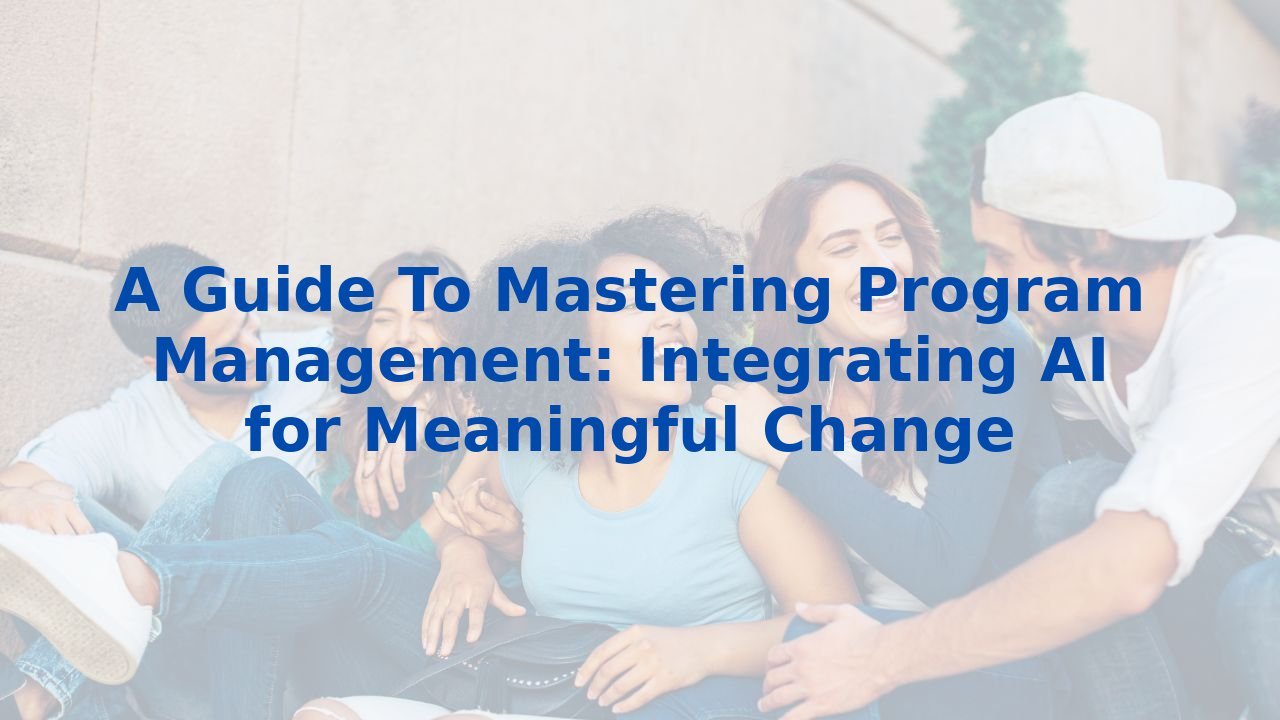A Guide To Mastering Program Management: Integrating AI for Meaningful Change
A Guide To Mastering Program Management: Integrating AI for Meaningful Change
In the ever-evolving landscape of business, program management serves as a vital conduit between organizational aspirations and tangible results. With the rapid advancement of technology, particularly Artificial Intelligence (AI), comes an incredible opportunity to reimagine program management processes. This guide unveils how AI can be seamlessly integrated into program management, augmenting efficiency and fostering meaningful change.
Efficiency Gains through Automation
One of the cornerstone advantages of AI lies in its capacity for automation. Program management often entails a plethora of routine tasks—think data entry, risk assessments, and stakeholder communications. These tasks can be labor-intensive and time-consuming. By embedding AI capabilities, organizations can witness substantial efficiency gains. Automation reduces the manual effort required, liberating program managers to focus on higher-level tasks that demand creativity and strategic foresight.
Imagine AI algorithms sifting through mountains of data to extract patterns and predict outcomes. This data-driven framework empowers program managers to make informed, strategic decisions, ensuring alignment with overarching goals. With such trajectories set by AI, programs are more likely to achieve not just defined targets but also unexpected innovations.
Enhanced Decision-Making with AI Insights
You see, the decision-making process can often be clouded by biases and assumptions. AI acts as a neutral partner, providing real-time insights and predictive analytics that shine a light on the path ahead. By examining historical data and spotting trends, AI aids program managers in navigating challenges effectively. For instance, it can highlight interdependencies among various projects, ensuring that every element functions cohesively within the broader framework of organizational strategy.
This proactive methodology creates a dynamic environment where programs are not just efficient; they also adapt fluidly to changing conditions. It's like having a digital compass that not only tells you where you are, but also forecasts where you might encounter obstacles, allowing for a more precise strategic response.
Improved Stakeholder Engagement
Engagement with stakeholders is critical for the success of any program. Yet, managing diverse stakeholder perspectives can be intricate. AI improves stakeholder interaction through automation and personalization. AI-powered tools can digest feedback and present summaries, making it easier for program managers to grasp the sentiments and concerns of various stakeholders.
Furthermore, AI optimizes scheduling and allocates resources efficiently, ensuring that the right teams are engaged at the right moments. This elevates productivity and maintains a flow of timely and relevant information, championing a culture where transparency and collaboration flourish. By fostering strong connections with stakeholders, organizations cultivate support that drives programs toward success.
Benefits of Training Employees for AI
While AI's capabilities can revolutionize program management, the human element remains indispensable. Equipping employees with the skills necessary to harness AI is essential. Training programs that focus on data analysis, predictive modeling, and strategic decision-making allow organizations to maximize AI’s potential.
Investing in your workforce empowers them to efficiently integrate AI tools within existing processes and accurately interpret AI-generated insights. A well-trained team is not just a valuable asset; they become the architects of transformation, facilitating strategic decisions that are informed by data rather than instinct.
Long-Term Impact and Strategic Alignment
AI's true potential shines in its ability to deliver long-term impact. By aligning programs with broader goals, organizations can leverage AI to monitor progress, ensuring continual adaptation in response to real-time feedback. This dynamic approach guarantees not only the effectiveness of programs but also their sustainability in contributing to organizational objectives.
AI's role in benefit realization cannot be overstated. It enables continuous improvement, constantly monitoring outcomes and generating insights on enhancement opportunities. This iterative cycle of feedback and action reinforces strategic alignment and cultivates environments where meaningful change is not just a goal but a consistent reality.
Conclusion
Embracing AI within the realm of program management opens doors to a more efficient, effective, and sustainable organizational landscape. Through automation, enhanced decision-making, and improved stakeholder engagement, AI reshapes the scope of what program managers can achieve. Moreover, prioritizing employee training ensures that the integration of AI is not merely an addition of technology, but a holistic transformation that inspires and elevates an entire organization.
As you stand at this crossroads of possibility, remember: the future belongs to those who dare to integrate these powerful tools, unlocking levels of productivity that can redefine success. The journey may be complex, yet the potential for deeper organizational impact has never been more attainable.



